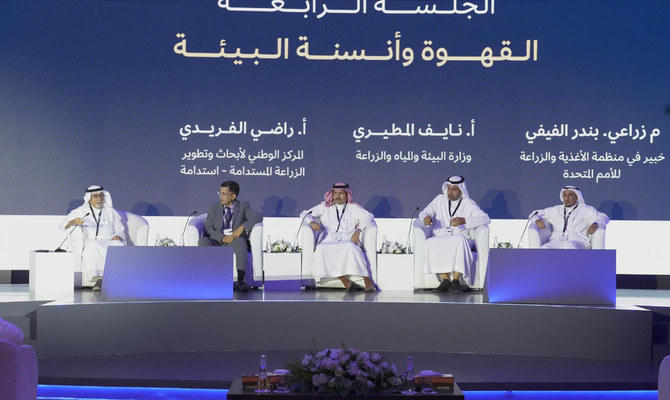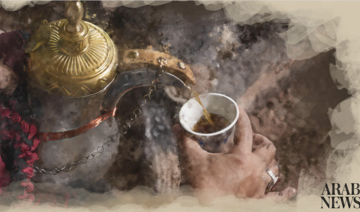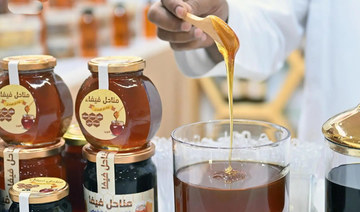JAZAN: The second day of the Saudi Coffee Sustainability Forum welcomed some of the Kingdom’s experts in medicine, research and agriculture to shed light on Saudi Arabia’s expanding coffee industry.
Organized by the Ministry of Culture and held at the Grand Millennium Jazan, the second day of the forum took a deeper look into joint cooperation in the agricultural sector as well as the positive and negative effects of caffeine.
During the first session, the panelists highlighted ways to promote research cooperation on a global basis and the current obstacles faced within the local coffee industry limiting international progress.
The speakers highlighted the important role the government and research agencies can play in the coffee sector. They also covered the specifics of farming coffee such as the types of beans, climate conditions, and the growing customer demand.
Bandar Al-Fifi, director of the National Coffee Component Food and Agriculture Organization, said: “Coffee is one of the most consumed beverages worldwide, and the average daily consumption of coffee is increasing year after year. The consumption of coffee (is) increasing worldwide and with it so is this demand.”
He stressed that this increase in consumption requires a rise in production to meet demand. He emphasized the importance of teaching the next generation about farming to secure growth for the industry.
Industry leaders need to teach “the importance of applying good practices of farming techniques, and strategies to protect the coffee from diseases and pests, in addition to knowing the varieties that must be grown in order to achieve high productivity and reduce crop losses,” he stressed.
During the same session, Radi Al-Faridi, deputy director general of the National Research and Development Center for Sustainable Agriculture, discussed the importance of cooperation of all authorities in agricultural integration.
“The definition of agricultural sustainability includes all environmental, social and economic aspects,” Al- Faridi said.
“Currently coffee is considered the second-largest traded commodity in the world after oil, with the global coffee market value reaching $102 billion in 2020. It is expected that the coffee market will continue to grow to reach a rate of 4.28 percent during the period 2022-2026, as we find that the expansion in the coffee market increases so will the pressure on coffee supply chains,” he said.
The second session of the Saudi Coffee Sustainability Forum welcomed a panel of medical specialists to highlight their research on the effects associated with the consumption of caffeine.
Dr. Amzaina Al-Naimi kicked off the final session of the forum, discussing a scientific paper on the effects of caffeine on mental health.
She highlighted the way caffeine contributes to the improvement of physical and cognitive performance of individuals. Al-Naimi said that a moderate (40 mg) to medium (300 mg) consumption of caffeine was a healthy way to improve alertness.
Rania Bogis, standards and regulations specialist of the Saudi Food and Drug Association, highlighted the various components in the different types of coffee that are present in the Kingdom and the safety measures and the proper storing methods that will prevent them from producing any harmful or poisonous elements.
“Supportive dates should be written on all products, the type of beans must be written, the types of roasting included even the types of grinding,” Bogis stressed.
“For instant Arabic coffee, it must be written on the packaging and the mix label, the additives must also always be clearly written as an additive,” she said.
The forum concluded on Sunday afternoon, with the Ministry of Culture highlighting 10 achievements the gathering accomplished.
The forum was designed to examine the challenges related to Saudi coffee in the value chain, the insight of farmers, obstacles they are facing as well as the ways to support and spark the entrepreneurship industry contributing to Saudi coffee on an international scale.
Closing the forum, Raed Alsufyani, the director of data management at the Ministry of Culture, highlighted 10 concepts discussed during the two-day event that will contribute to the sector.
1. Considering the accession of Saudi Arabia to the International Coffee Organization to exchange experiences.
2- Cooperating with international organizations related to research and promoting the field of scientific research for coffee.
3- Holding a special annual forum to discuss the advantages, aspirations and achievements of coffee.
4- Studying the launch of specialized indicators in cooperation with stakeholders to monitor support for the industry in this sector.
5- A day dedicated to celebrating coffee in the Kingdom.
6- Enhancing the role of farmers to improve production and sector sustainability.
7- Supporting the innovation and entrepreneurship industry to support the value and sustainability of Saudi coffee.
8. The presence of potential in the Kingdom to be in the first place for the manufacture and trade of coffee with unique specifications, including the coffee fruit and its strategic location.
9- The consideration of establishing an electronic magazine for Saudi coffee.
10 - Allocating an annual award for the best efforts, in all its diversity and in the media and culture, to contribute to the Saudi coffee sector.




























